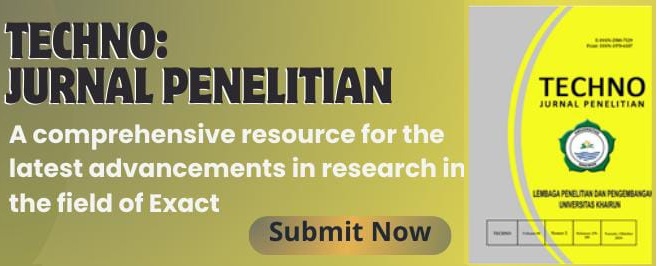Analysis of Marine Debris Distribution Through Sort Transport Clean in the Coastal Waters of Ternate City
Abstract
Keywords
Full Text:
PDFReferences
Anunobi, T. J. (2022). Hazardous effects of plastic wastes on land biodiversity: A review. Zoologist (The), 20(1), 80–86. https://doi.org/10.4314/tzool.v20i1.10.
Azfaralariff, A., Mat Lazim, A., Amran, N. H., Mukhtar, N. H., Bakri, N. D., Azrihan, N. N., & Mohamad, M. (2023). Mini review of microplastic pollutions and its impact on the environment and human health. Waste Management & Research: The Journal for a Sustainable Circular Economy, 41(7), 1219–1226. https://doi.org/10.1177/0734242X231155395.
Babu T, N. S., Sindhu, P., Anand, D. R. G., & Mary T, M. S. (2023). A study on the effects of plastic on marine life & its possible solutions. Interantional Journal of Scientific Research in Engineering and Management, 07(04), 1-9. https://doi.org/10.55041/IJSREM18790.
Baranova, A., Novozhilova, T., Litovka, A., & Bilousov, M. (2022). The problem of plastic waste pollution in the world ocean. Bulletin of the National Technical University «KhPI» Series: New Solutions in Modern Technologies, 2(12), 69–73. https://doi.org/10.20998/2413-4295.2022.02.10.
Catarci, C. C., Amato, E. D., Pfeiffer, F., Christia, C., Estoppey, N., Poma, G., Covaci, A., & Blust, R. (2023). Accumulation and release of organic pollutants by conventional and biodegradable microplastics in the marine environment. Environmental Science and Pollution Research, 30(31), 77819–77829. https://doi.org/10.1007/s11356-023-27887-1.
Cirino, E., Curtis, S., Wallis, J., Thys, T., Brown, J., Rolsky, C., & Erdle, L. M. (2023). Assessing benefits and risks of incorporating plastic waste in construction materials. Frontiers in Built Environment, 9. https://doi.org/10.3389/fbuil.2023.1206474.
Damayanti, A. D., Hanami, Z. A., Hirose, K., Ainun, S., & Putra, R. D. (2022). Potential marine plastic debris detection using sentinel-2 multi-spectral instrument (MSI). IOP Conference Series: Earth and Environmental Science, 1117(1), 012054. https://doi.org/10.1088/1755-1315/1117/1/012054.
Gabriel, A. D., & Bacosa, H. P. (2024). Microplastic abundance and distribution in the sediment of Cagayan de Oro River, Philippines. Soil and Sediment Contamination: An International Journal, 33(8), 1252-1268. https://doi.org/10.1080/15320383.2023.2301495.
García-Hermosa, M. I., & Woodall, L. C. (2023). Marine plastic: The solution is bigger than removal. Frontiers in Sustainability, 4, 1023480. https://doi.org/10.3389/frsus.2023.1023480.
Grilli, G., Andrews, B., Ferrini, S., & Luisetti, T. (2022). Could a mix of short- and long-term policies be the solution to tackle marine litter? Insights from a choice experiment in England and Ireland. Ecological Economics, 201, 107563. https://doi.org/10.1016/j.ecolecon.2022.107563.
Khezri, M., & Mamkhezri, J. (2025). Evaluating the ecological footprints of entrepreneurial activities: Insights from a cross-country assessment. Technology in Society, 81, 102815. https://doi.org/10.1016/j.techsoc.2025.102815.
Lippiatt, S., Opfer, S., & Arthur, C. (2013). Marine debris monitoring and assessment: recommendations for monitoring debris trends in the marine environment. NOAA Technical Memorandum NOS-OR&R-46, 88 pp. http://dx.doi.org/10.25607/OBP-727.
Liu, J., Wu, D., Hellevik, C. C., & Wang, H. (2023). PlastOPol: A collaborative data-driven solution for marine litter detection and monitoring. 2023 IEEE International Conference on Industrial Technology (ICIT), 1–6. https://doi.org/10.1109/ICIT58465.2023.10143112.
Meng, J., Zhang, Q., Zheng, Y., He, G., & Shi, H. (2021). Plastic waste as the potential carriers of pathogens. Current Opinion in Food Science, 41, 224–230. https://doi.org/10.1016/j.cofs.2021.04.016.
Pourebrahimi, S., & Pirooz, M. (2023). Microplastic pollution in the marine environment: A review. Journal of Hazardous Materials Advances, 10, 100327. https://doi.org/10.1016/j.hazadv.2023.100327.
Prabawati, A., Frimawaty, E., & Haryanto, J. T. (2023). Strengthening stakeholder partnership in plastics waste management based on circular economy paradigm. Sustainability, 15(5), 4278. https://doi.org/10.3390/su15054278.
Pramudianto, A. (2023). The need for asian regional cooperation in establishing international agreements on marine plastic debris. Russian Law Journal, 11(3), 95-99. https://doi.org/10.52783/rlj.v11i3.959.
Rai, M., Pant, G., Pant, K., Aloo, B. N., Kumar, G., Singh, H. B., & Tripathi, V. (2023). Microplastic pollution in terrestrial ecosystems and its interaction with other soil pollutants: A potential threat to soil ecosystem sustainability. Resources, 12(6), 67. https://doi.org/10.3390/resources12060067.
Sannigrahi, S., Pilla, F., Maiti, A., Bar, S., Bhatt, S., Zhang, Q., ... & Cerda, A. (2022). Examining the status of forest fire emission in 2020 and its connection to COVID-19 incidents in West Coast regions of the United States. Environmental Research, 210, 112818. https://doi.org/10.1016/j.envres.2022.112818.
Sasradinata, I., Pramono, A., & Lufsiana, L. (2023). Pengaturan hukum laut internasional dan nasional dalam pencemaran lingkungan hidup di perairan indonesia akibat sampah plastik. ARBITER: Jurnal Ilmiah Magister Hukum, 5(1), 23–29. https://doi.org/10.31289/arbiter.v5i1.1645.
Saud, S., Yang, A., Jiang, Z., Ning, D., & Fahad, S. (2023). New insights in to the environmental behavior and ecological toxicity of microplastics. Journal of Hazardous Materials Advances, 10, 100298. https://doi.org/10.1016/j.hazadv.2023.100298.
Sina, Pourebrahimi., Majid, P. (2023). Microplastic pollution in the marine environment: A review. Journal of Hazardous Materials Advances, 10, 100327. https://doi.org/10.1016/j.hazadv.2023.100327.
Thongphaijit, P. (2020). Fishermen's participation in marine litter collection schemes in Thailand. Chulalongkorn University Theses and Dissertations (Chula ETD). 458. https://doi.org/10.58837/CHULA.THE.2020.192.
Utami, D. A., Reuning, L., Schwark, L., Friedrichs, G., Dittmer, L., Nurhidayati, A. U., Al Fauzan, A., & Cahyarini, S. Y. (2023). Plastiglomerates from uncontrolled burning of plastic waste on Indonesian beaches contain high contents of organic pollutants. Scientific Reports, 13(1), 10383. https://doi.org/10.1038/s41598-023-37594-z.
Wang, L., Bank, M. S., Rinklebe, J., & Hou, D. (2023). Plastic–rock complexes as hotspots for microplastic generation. Environmental Science & Technology, 57(17), 7009–7017. https://doi.org/10.1021/acs.est.3c00662.
Winterstetter, A., Veiga, J. M., Sholokhova, A., & Šubelj, G. (2023). Country-specific assessment of mismanaged plastic packaging waste as a main contributor to marine litter in Europe. Frontiers in Sustainability, 3. https://doi.org/10.3389/frsus.2022.1039149.
Yuliantiningsih, A., Suherman, A. M., & Jati, B. K. H. (2023). Marine plastic pollution handling based on international and indonesian law to support sustainable development goals. UNIFIKASI: Jurnal Ilmu Hukum, 10(01), 58-73. https://doi.org/10.25134/unifikasi.v10i1.7498.
DOI: https://doi.org/10.33387/tjp.v13i2.8358
Data citation
not
Refbacks
- There are currently no refbacks.
Copyright (c) 2024 Yumima Sinyo

This work is licensed under a Creative Commons Attribution-NonCommercial 4.0 International License.
-------------------------------------------------------------------------------------------------------------------------------------------------------------------
-------------------------------------------------------------------------------------------------------------------------------------------------------------------
TECHNO: Jurnal Penelitian
Published by: LPPM Universitas Khairun
Addres : Jalan Yusuf Abdurrahman Kampus II Unkhair, Kelurahan Gambesi, 97722 Kecamatan Kota Ternate Selatan, Provinsi Maluku Utara, Email: techno@unkhair.ac.id | URL: http://ejournal.unkhair.ac.id/index.php/Techno
Techno Jurnal Penelitian is licensed under a Creative Commons Attribution-NonCommercial 4.0 International License.


























